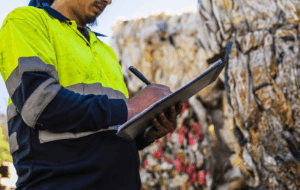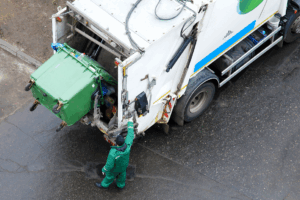Why Hiring a Waste Management Consultant Is Crucial for Your Business
A waste management consultant brings expertise and data-driven strategies to streamline your waste and recycling operations. By evaluating your current program, identifying inefficiencies, and holding vendors accountable, consultants transform waste from a hidden liability into a well-managed, cost-efficient part of your business. From compliance and cost reduction to cleaner operations and smarter use of technology, the benefits go far beyond sustainability alone.
Managing waste effectively isn’t just about meeting sustainability goals—it’s about optimizing the entire health and efficiency of your waste and recycling program. For most businesses, waste remains an overlooked expense that drains resources, increases operational risk, and creates inefficiencies across facilities, with outdated systems, underperforming vendors, and poorly designed programs that can cost far more than necessary.
This is where working with a waste management consultant becomes a powerful asset. These professionals go beyond logistics, they provide tailored strategies that align with industry regulations, help meet environmental goals, and lower overall waste-related expenses. Below, we explore why hiring a consultant is not just a smart move, but an essential one.
 1. How Do Consultants Help Reduce Waste-Related Costs?
1. How Do Consultants Help Reduce Waste-Related Costs?
Consultants reduce waste-related costs by identifying inefficiencies through audits and implementing smarter, more strategic systems. This can include right-sizing containers, optimizing pickup schedules, and boosting recycling efforts—resulting in measurable savings and improved operational efficiency.
One of the biggest benefits of hiring a consultant is their ability to uncover inefficiencies that drive up your waste expenses, and then fix them strategically.
Most businesses don’t realize they’re overpaying for waste services. You may be using bins that are too large or too small, scheduling pickups too frequently, or paying to send recyclable materials to landfill. A consultant conducts a full waste audit to map out what you’re generating, how it’s being handled, and where money is being wasted.
Based on that analysis, they’ll implement solutions like optimizing bin placement, switching to right-sized containers, increasing recycling and composting efforts, and renegotiating hauling contracts. The result? A more cost-effective, data-driven waste system that delivers measurable savings without sacrificing service or sustainability.
2. How Do Consultants Improve the Total Health of Your Waste Program?
Consultants don’t just reduce costs—they improve the overall health and efficiency of your waste and recycling program. By holding vendors accountable, streamlining operations, and providing better data visibility, they ensure your system is reliable, compliant, and built for long-term success.
Cost savings are important, but true value comes from building a well-structured, efficient, and accountable waste program. A consultant looks beyond invoices and pickup schedules to assess the overall health of your waste and recycling operations.
That means evaluating:
- Vendor performance – Are your haulers meeting service levels, providing accurate reporting, and delivering on their contracts? Consultants ensure vendors are held accountable and, if needed, help renegotiate terms or transition to stronger partners.
- Operational efficiency – From container placement to staff workflows, consultants streamline processes to reduce contamination, prevent overflows, and eliminate inefficiencies that drive up costs.
- Waste and recycling mix – They identify opportunities to increase diversion rates, reduce contamination, and ensure valuable recyclables aren’t ending up in landfills.
- Data visibility – Consultants implement reporting and tracking systems that give you clear insight into waste volumes, recycling rates, and vendor performance across all locations.
By taking this holistic approach, consultants don’t just trim costs—they create a healthier, more resilient waste program that reduces risk, improves service reliability, and positions your business for long-term success.
3. How Can a Consultant Help You Stay Compliant with Regulations?
Consultants don’t just keep you compliant—they make sure vendors aren’t inflating costs or adding unnecessary steps under the guise of “regulatory requirements.” By integrating compliance into a streamlined, well-managed waste system, they help you stay audit-ready while keeping operations efficient and cost-effective.
Compliance is one of the most critical, and often overlooked, aspects of waste management, and a consultant ensures you stay ahead of every legal requirement. However, a consultant can also help you do this without over engineering solutions or over paying for unnecessary services.
The Environmental Protection Agency (EPA) and other authorities enforce stringent rules around waste handling, especially when it comes to medical waste, hazardous materials, electronic waste, and regulated recyclables. These laws are complex and subject to change, making it difficult for businesses without dedicated environmental personnel to keep up. Non-compliance can lead to hefty fines, legal action, and even forced closure.
A waste management consultant monitors all federal laws, as well as state and local waste regulations that apply to your business. They ensure your systems—from storage and labeling to hauling and documentation—are audit-ready at all times. This is especially vital in highly regulated industries like healthcare, food manufacturing, or chemicals, where compliance errors can be costly and dangerous.
4. How Does Better Waste Management Improve Workplace Safety and Cleanliness?
Consultants improve workplace safety and cleanliness by identifying risks in waste handling and recommending safer, more efficient systems and tools. This can include upgrades like balers, compactors, or smart sensors that not only improve safety but also streamline operations and reduce unnecessary vendor pickups. These improvements cut down on inefficiencies while creating a cleaner, safer, and more professional environment.
Effective waste management isn’t just about reducing costs—it plays a direct role in keeping your workplace safe, clean, and operationally efficient. A consultant can help prevent health hazards, reduce accidents, and promote a cleaner, more professional environment.
When waste systems are poorly designed or maintained, businesses can face overflowing bins, pest infestations, unpleasant odors, and increased risks of accidents. Improper handling of hazardous waste, in particular, can lead to contamination or exposure that endangers employees and visitors—and invites serious fines from health and safety inspectors.
A waste management consultant evaluates your entire waste handling process from a health and safety perspective. They recommend safe storage practices, provide staff training, and suggest upgrades such as compactors, balers, or labeled disposal stations. These improvements not only protect people but help create a cleaner, more organized, and more professional environment.
 5. Why Do You Need Custom Waste Solutions for Your Industry?
5. Why Do You Need Custom Waste Solutions for Your Industry?
Industry-specific waste management systems often require specialized haulers or service providers, and consultants ensure those partners deliver on both service quality and cost efficiency. By holding vendors accountable, they tailor waste solutions that fit your unique operational needs without wasted spend or underperformance.
Every industry has its own waste profile, and one-size-fits-all solutions often fall short. Waste consultants create customized solutions tailored to your industry’s specific waste streams, regulations, and operational needs. This ensures more effective, compliant, and efficient waste management that supports your business goals.
For example, a retail business may generate large volumes of cardboard and plastic packaging, while a healthcare facility must manage medical sharps and biohazard materials. Industrial plants may need to separate hazardous chemicals from general waste, while food manufacturers might prioritize composting or anaerobic digestion.
A consultant works to understand your workflow, materials, regulatory challenges, and long-term goals. Then, they design a tailored program that addresses your unique requirements—whether it involves waste stream segregation, specialized containers, or industry-specific compliance documentation. The result is a waste solution that works with your business, not against it.
6. How Is Smart Waste Management Changing Business Operations?
Smart waste technologies like IoT sensors and data dashboards are revolutionizing operations, and consultants ensure their seamless integration. However, smart technologies don’t just track your waste—they provide visibility into whether vendors are meeting expectations, from on-time pickups to contamination rates. This data holds service providers accountable while giving you the insights needed to optimize performance across your entire waste program.
New technologies are transforming how businesses manage waste—and consultants can help you implement them for better control, tracking, and efficiency. The result is greater visibility on the total health and efficiency of waste management systems, as well improved decision-making through real-time insights.
Smart waste management uses tools like IoT sensors, data dashboards, and AI-powered analytics to provide real-time insights into how waste is generated and managed. For instance, bins can be equipped with sensors that signal when they’re full, allowing you to reduce unnecessary pickups. Digital platforms can show waste volumes and diversion rates across multiple sites, making it easier to spot inefficiencies and act quickly.
A consultant helps you adopt and integrate these technologies seamlessly. Whether it’s using smart bins, or generating data-rich reports for ESG metrics, they ensure your waste system is as modern, measurable, and efficient as the rest of your operations.
7. Why Is It Important to Stay Ahead of Market Trends?
Staying ahead of waste industry trends gives your business a competitive edge, and consultants help you adapt to evolving technologies and regulations. Their insights position your company as a forward-thinking leader in sustainability and allow you to stay ahead of shifting market dynamics by adapting waste programs to new technologies, changing disposal costs, and evolving vendor practices. While sustainability remains a valuable outcome, the primary advantage is staying operationally agile and cost-efficient in a rapidly changing industry.
The waste management market size has grown significantly in recent years, fueled by increasing regulation, environmental awareness, and demand for sustainability. This growth brings new opportunities, such as circular economy partnerships, innovations in waste-to-energy, and advanced recycling solutions. But it also means greater competition and higher expectations from stakeholders.
A consultant stays up-to-date on these shifts and advises you on how to adapt. Whether it’s helping your business communicate and collaborate with vendors, become landfill-free, adopt extended producer responsibility practices, or evaluate new technologies, consultants help you remain proactive rather than reactive. Staying ahead isn’t just about avoiding problems—it’s about positioning your business as a leader in sustainability.
8. How Does Effective Waste Management Improve Brand Reputation?
Effective waste management boosts brand reputation by showcasing your commitment to sustainability—something customers, investors, and employees value. Consultants help you highlight these efforts through certifications, milestones, and community initiatives that build trust and loyalty.
Today’s customers, investors, and employees care about how companies treat the planet—and waste plays a big part in that perception. If your business is seen as careless, polluting, or indifferent to sustainability, it can damage your brand image and erode customer trust. On the other hand, a company that prioritizes responsible waste practices can use that commitment as a marketing and recruitment advantage.
A waste management consultant can help shape and communicate that story. From achieving certifications and publishing reduction milestones to supporting community clean up and recycling programs, they help you demonstrate your values in action. A strong environmental reputation not only builds loyalty but sets you apart in a crowded market.
9. How Can Waste Management Support ESG and Sustainability Goals?
Waste consultants align your waste management strategy with ESG goals by implementing reduction plans and tracking measurable outcomes. Their support helps demonstrate your commitment to sustainability, setting your business apart in today’s values-driven market.
A strategic approach to waste management is no longer just a cost-saving measure—it’s a critical part of your company’s environmental and social responsibility profile.
As investors, consumers, and partners prioritize Environmental, Social, and Governance (ESG) performance, businesses must show progress on sustainability. That includes how waste is tracked, reduced, and diverted from landfills. Aligning your waste management with ESG goals requires not just intention—but data, strategy, and measurable outcomes.
A consultant can help you build and execute a waste reduction plan that contributes directly to your ESG objectives. That may involve zero-waste and e-waste initiatives, food waste diversion, plastic reduction strategies, or reporting tools that quantify landfill diversion and carbon footprint. These actions don’t just support compliance—they help you stand out as a values-driven business in a competitive market.
 Final Thoughts
Final Thoughts
Waste management is no longer an afterthought, it’s a strategic business function that directly impacts your costs, efficiency, compliance, and reputation. A skilled waste management consultant helps you take control of your entire waste and recycling program by cutting unnecessary costs, improving vendor performance, and implementing smarter technologies.
While sustainability and ESG benefits are important, the primary value of a consultant lies in building a healthier, more efficient waste program that saves money, minimizes risk, and keeps your operations running smoothly.
Whether you’re struggling with rising waste costs, inconsistent vendor service, or outdated processes, a consultant provides the expertise and accountability needed to transform waste from a liability into an operational advantage.
SOURCES
U.S. Environmental Protection Agency. (n.d.). Medical waste. https://www.epa.gov/rcra/medical-waste
Library of Congress. (n.d.). Federal environmental laws. https://guides.loc.gov/environmental-law/federal-laws
ESG.org. (n.d.). ESG: Environmental, social, and governance. https://www.esg.org/
Earth.Org. (2023, August 8). What is food waste? https://earth.org/what-is-food-waste/
World Health Organization. (2023, March 15). Electronic waste (e-waste). https://www.who.int/news-room/fact-sheets/detail/electronic-waste-(e-waste)
Market.us. (2024, February 5). Waste management market news. https://www.news.market.us/waste-management-market-news/
EarthDay.org. (n.d.). 7 steps to hosting a successful cleanup. https://www.earthday.org/7-steps-to-hosting-a-successful-cleanup/
MarketsandMarkets. (n.d.). Waste management market by waste type, service, end user & region – Global forecast to 2028. https://www.marketsandmarkets.com/Market-Reports/waste-management-market-72285482.html
U.S. Environmental Protection Agency. (n.d.). United States Environmental Protection Agency. https://www.epa.gov/
RTS. (n.d.). Waste management consultant services. https://www.rts.com/services/waste-management-consultant/
RTS. (2023, May 23). Smart waste management technologies: What they are and how they work. https://www.rts.com/blog/smart-waste-management-technologies/
RTS. (n.d.). Food waste recycling services. https://www.rts.com/waste-type/foodwaste/
RTS. (n.d.). Electronics recycling services. https://www.rts.com/waste-type/electronics-recycling/

